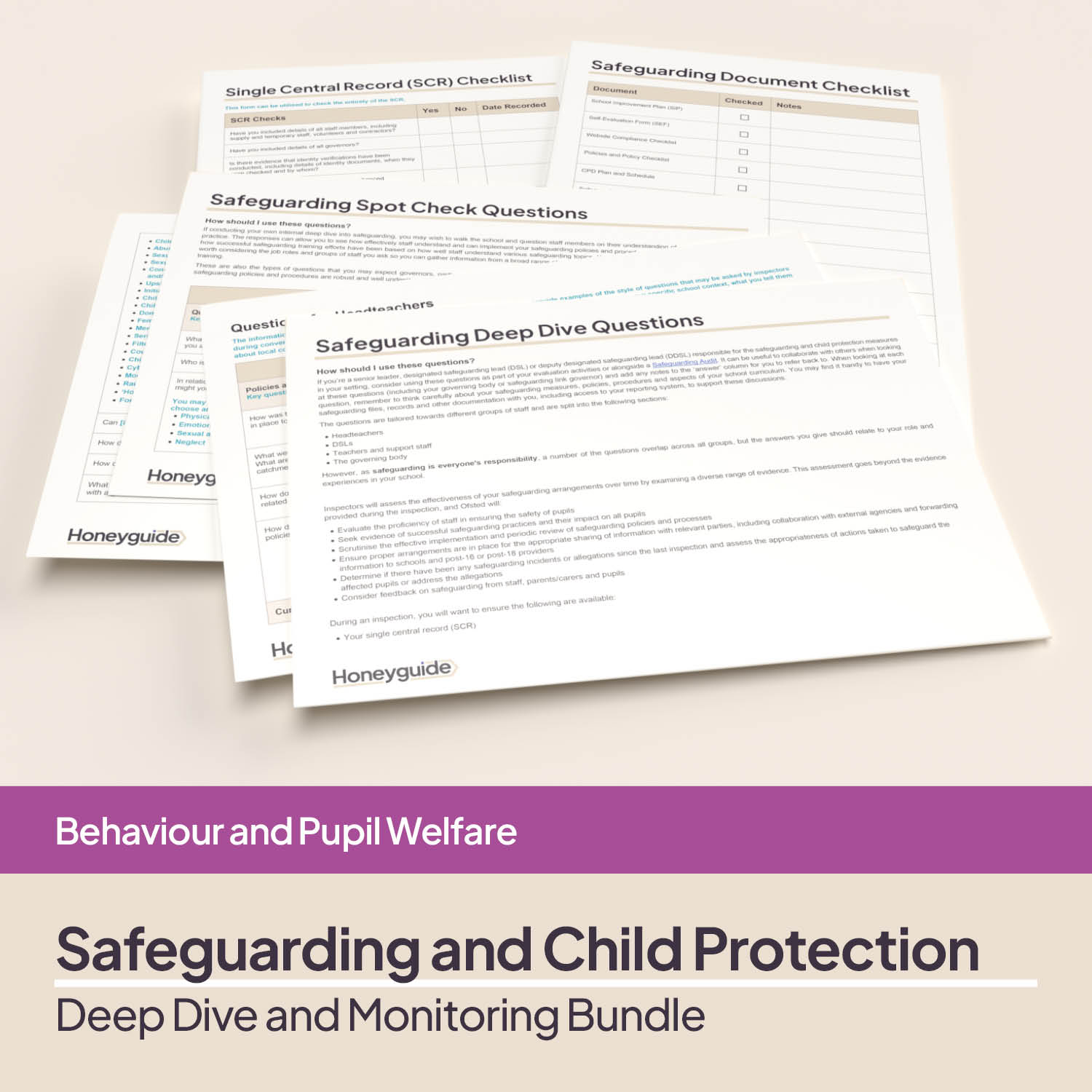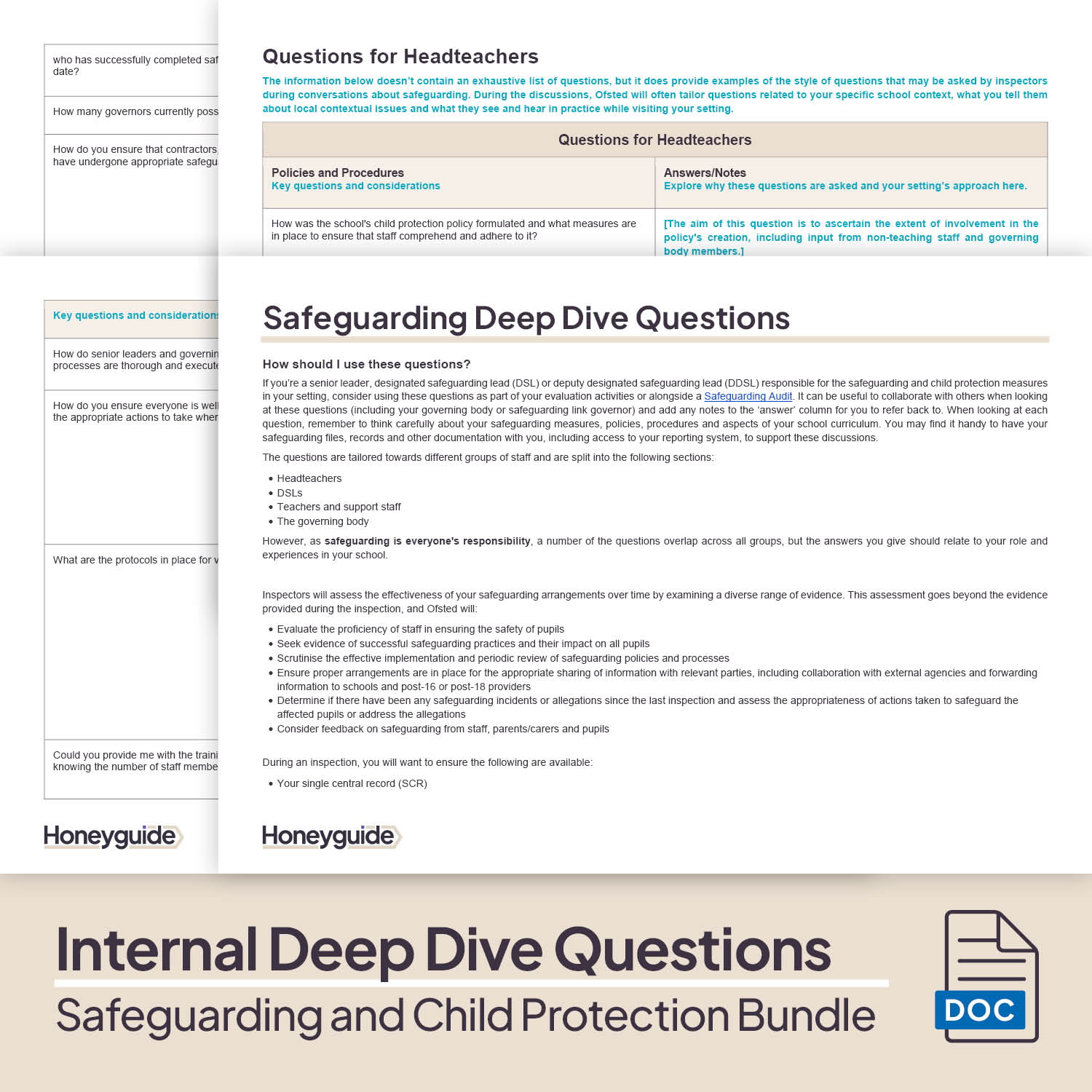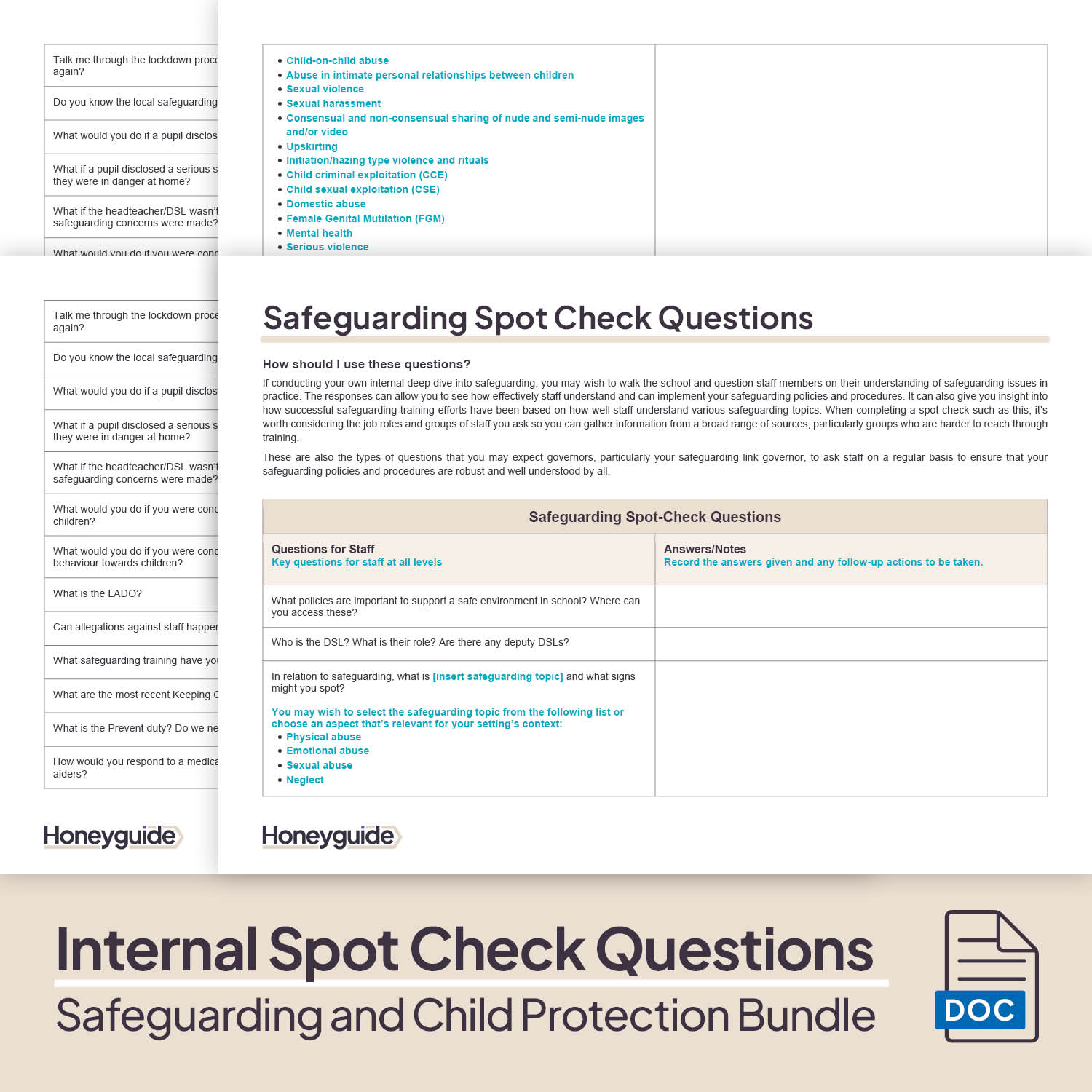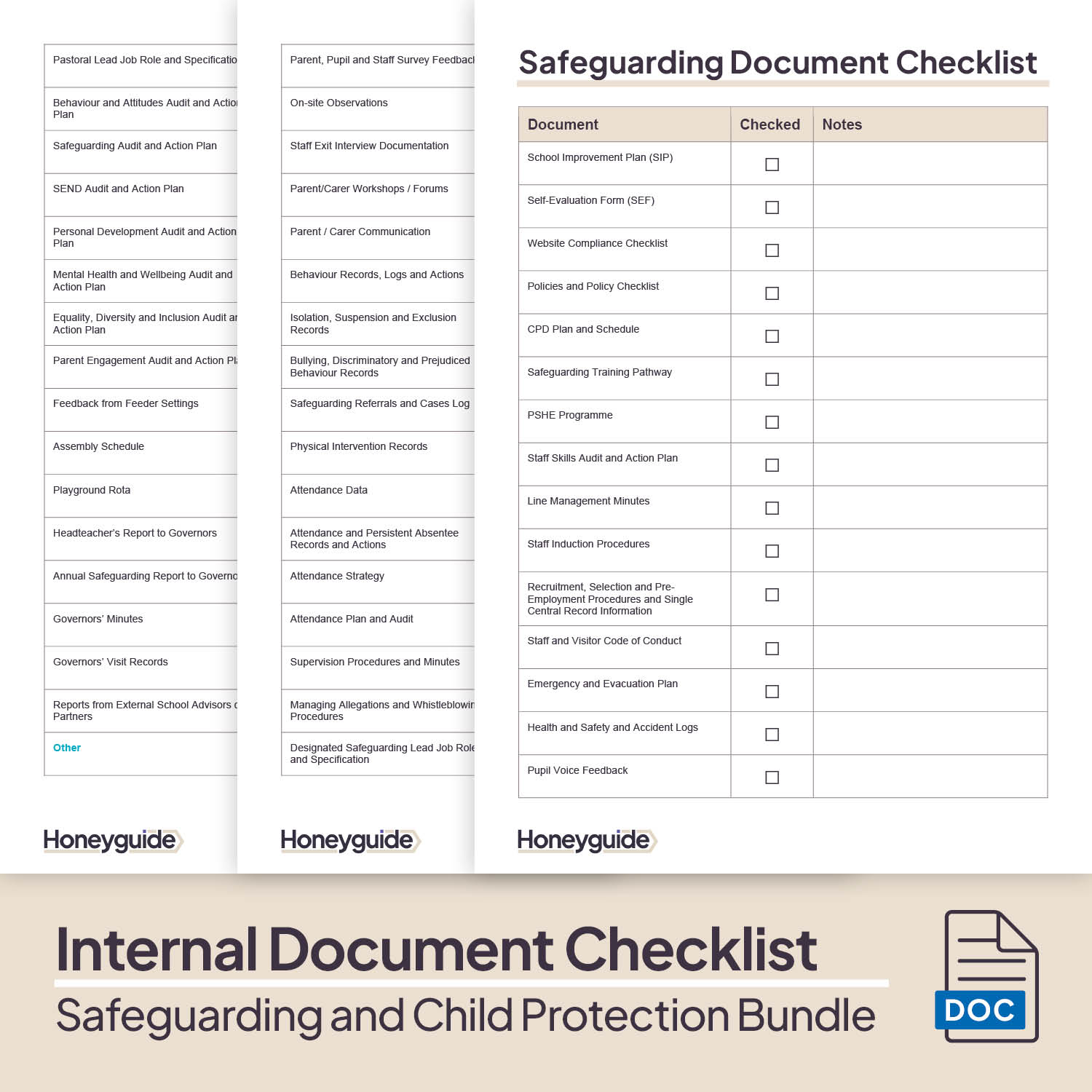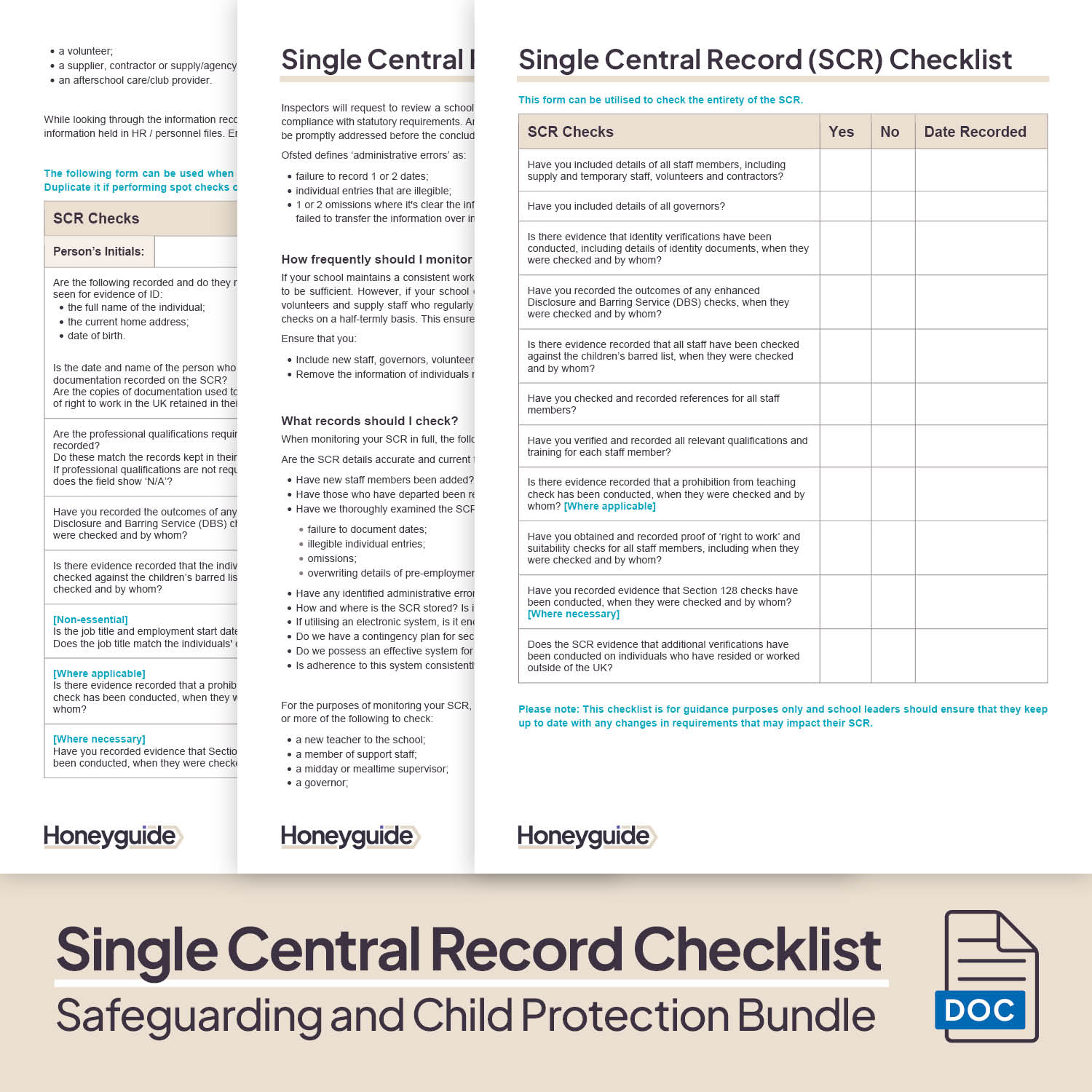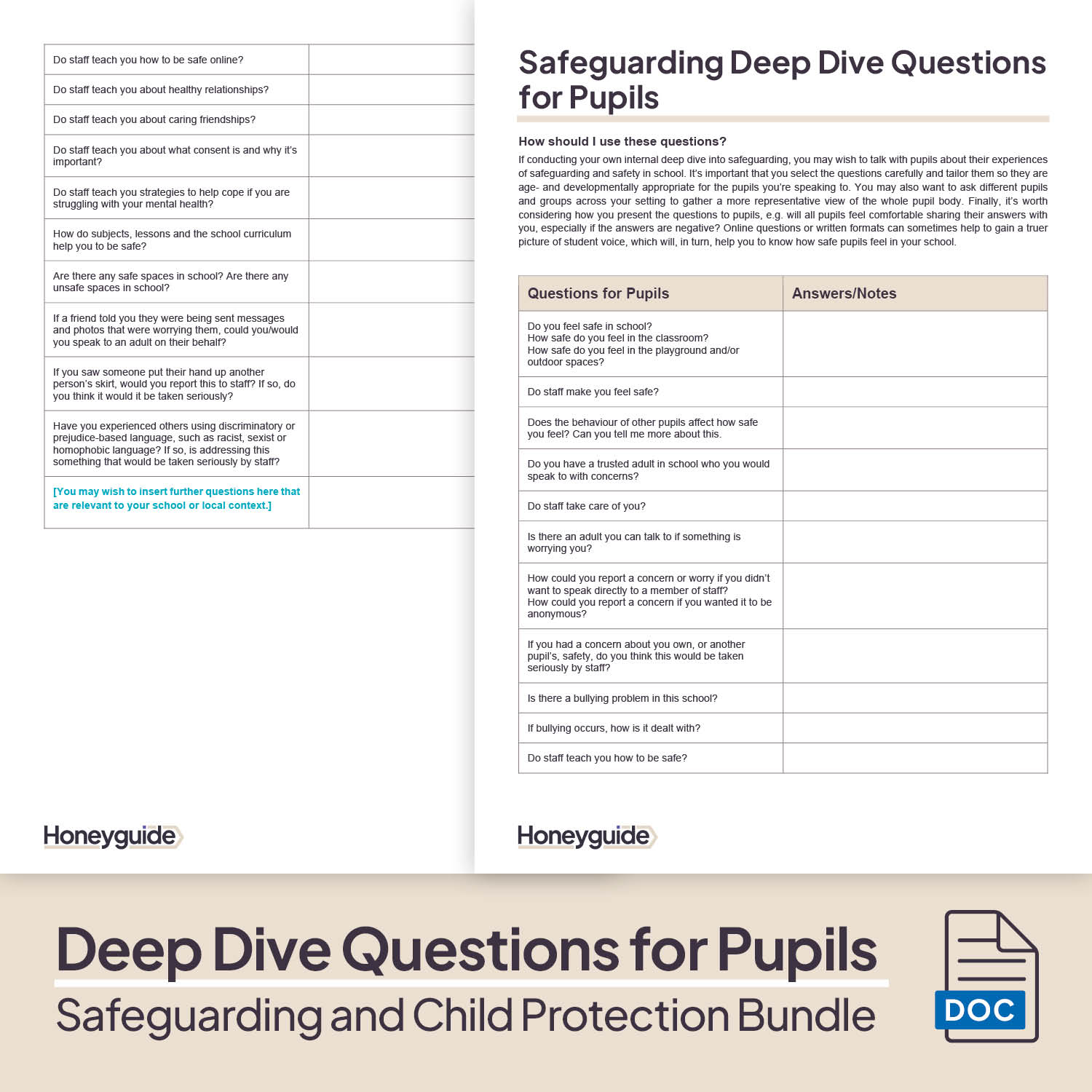Honeyguide School Leader Support
Safeguarding and Child Protection Deep Dive
Safeguarding and Child Protection Deep Dive
Thinking about doing a spot check on your safeguarding and child protection procedures or wondering what Ofsted will ask about safeguarding when they visit in 2025? This pack, perfect for school leaders and DSLs, has been designed to give you the tools to gather a snapshot view of safeguarding in your setting, allowing you to gain insight into how others could view your safeguarding practice.
- Buy what you need when you need it
- No costly subscription required
- Instant download
Couldn't load pickup availability
Share
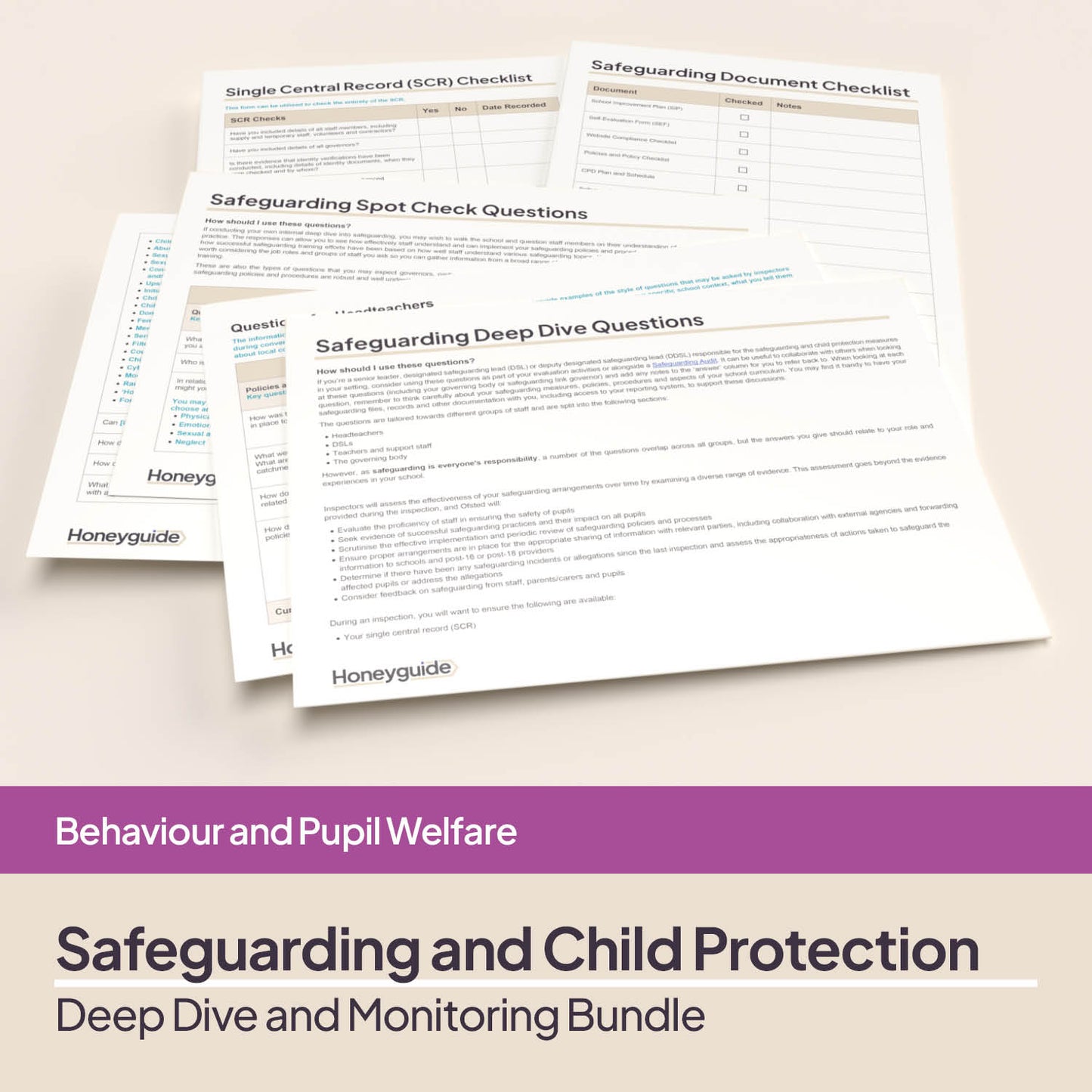
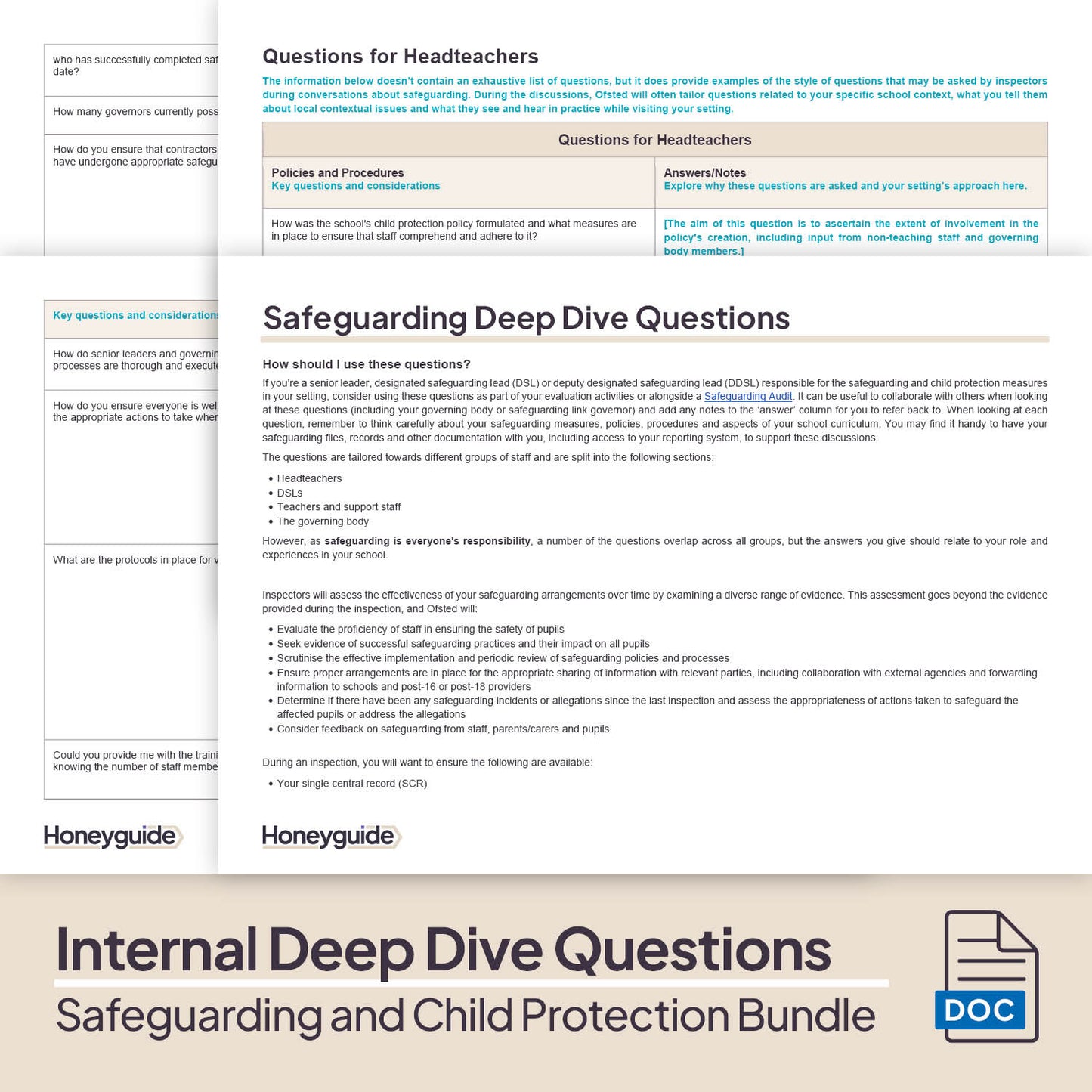
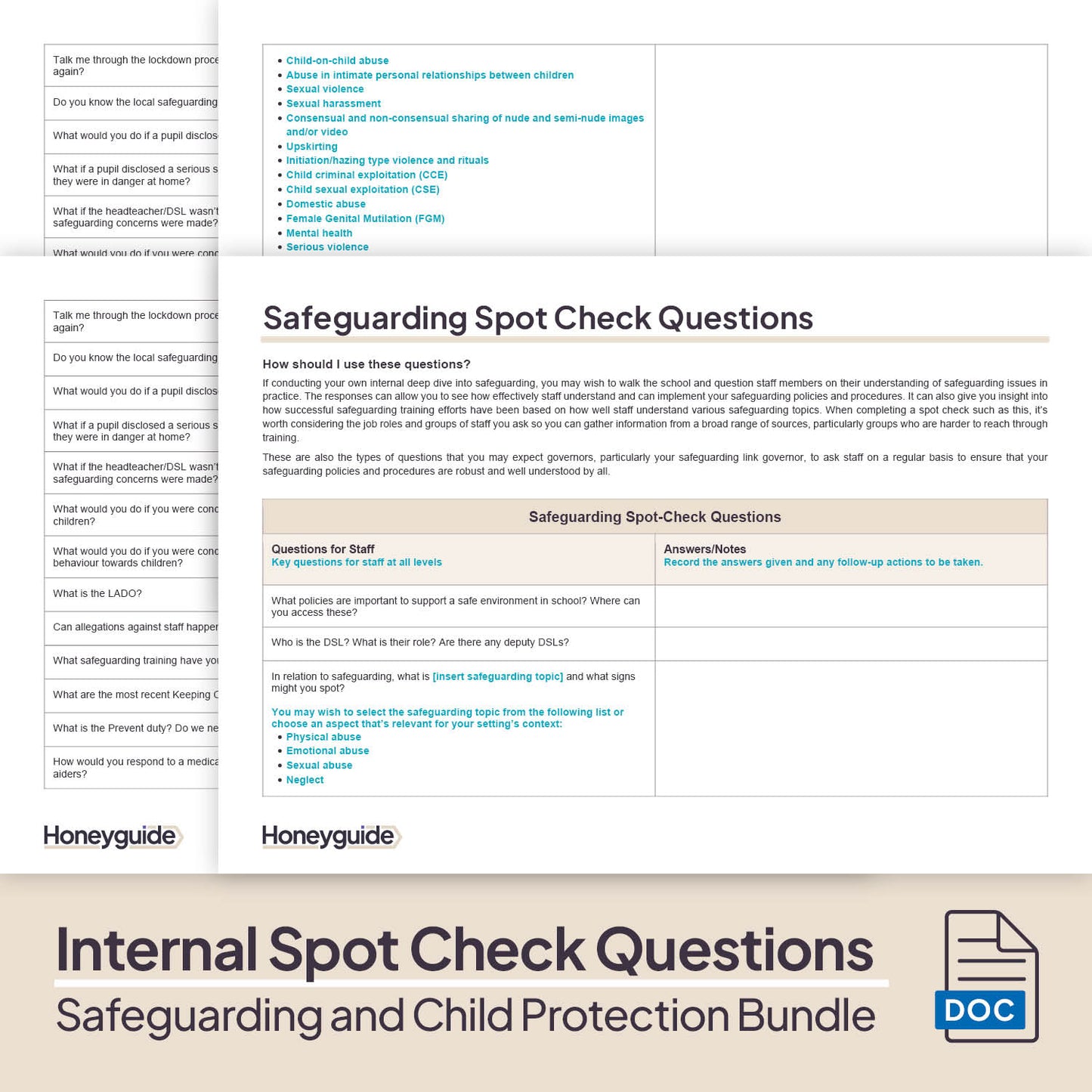
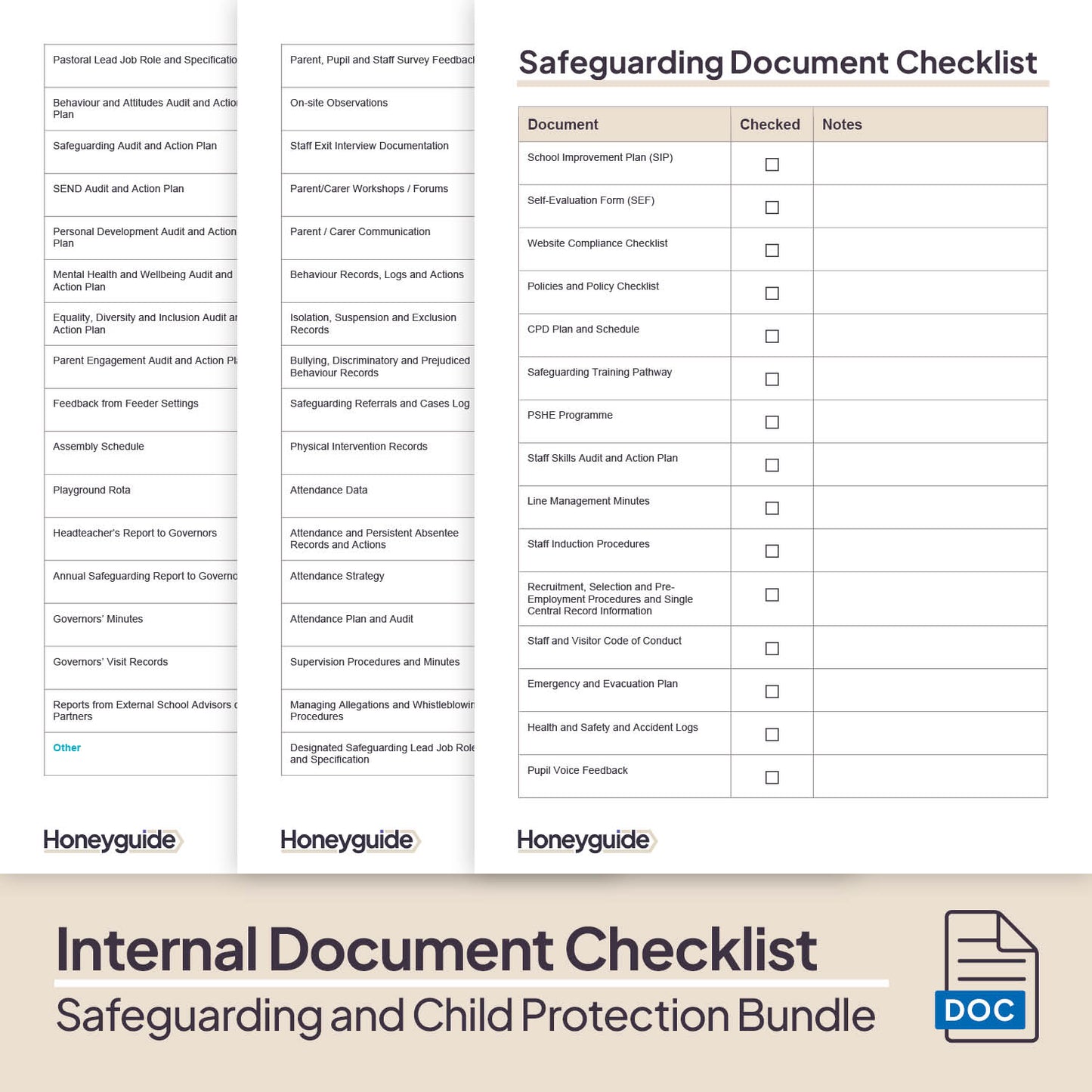
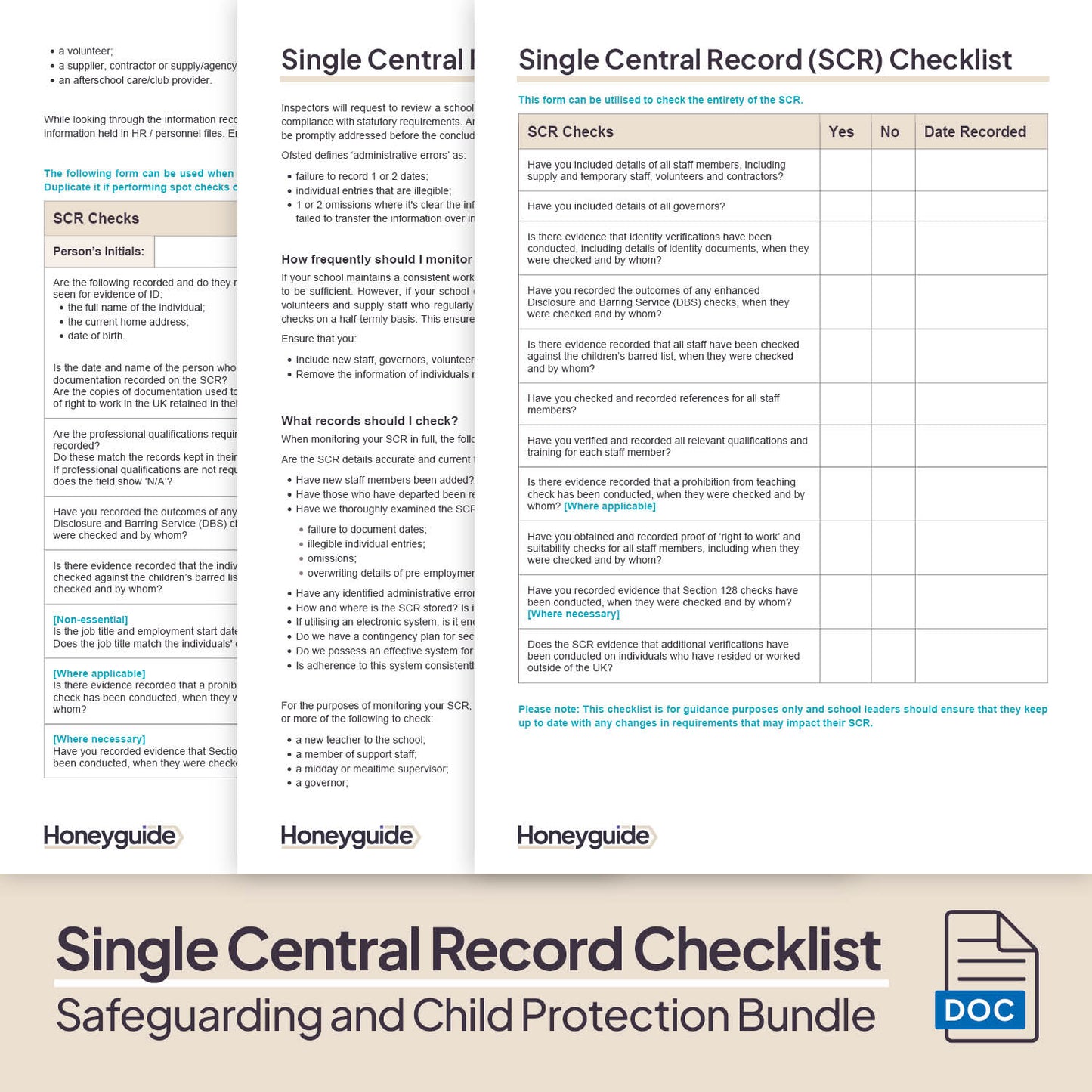
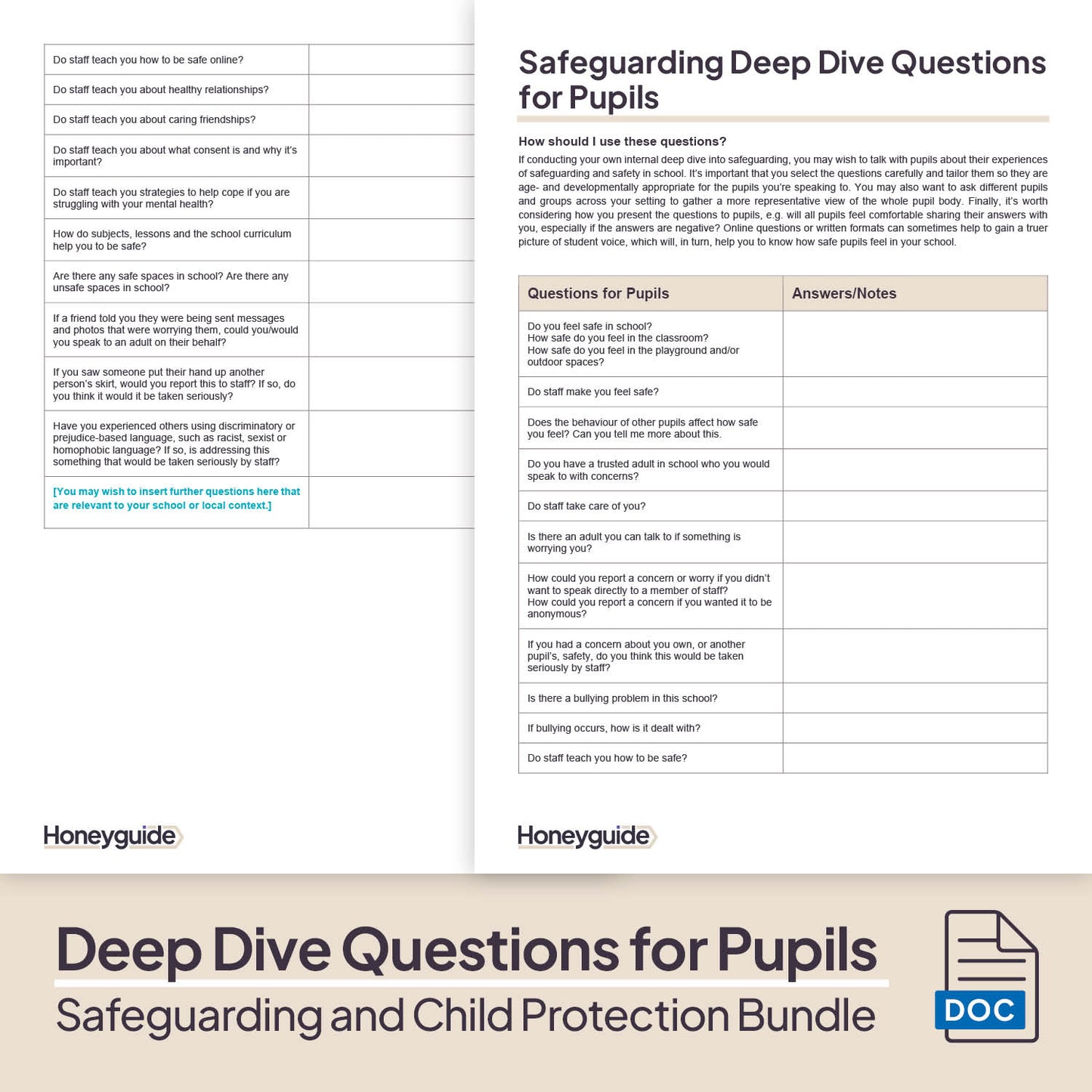
Collapsible content
What's included in this bundle?
Fully up to date with the latest 2024 Keeping Children Safe in Education (KCSIE) and the April 2024 changes to safeguarding in the Ofsted School Inspection Handbook, this bundle is designed to support DSLs, school and trust leaders. It contains five fully editable templates that allow you to gather information about the effectiveness of your current safeguarding practices over a short period of time, similar to how Ofsted would gather safeguarding information during an inspection. The questions within are designed in a safeguarding deep dive style and you can pick and choose from the huge range available if you're looking to test out how robust your safeguarding processes are, meaning you can use the pack multiple times where needed. You can gather information about your school's culture of safeguarding by using the following editable documents in this bundle pack:
1. Safeguarding Deep Dive Questions - while Ofsted don't conduct a deep dive in safeguarding in the same way as they would with the curriculum subjects, they do explore different facets of safeguarding with the designated safeguarding lead (DSL), staff and pupils. This Ofsted safeguarding questions document provides over 150 questions which are split into different sections so you can ask tailored questions to the headteacher, the DSL and safeguarding team, teaching and support staff, and governors. Each question also contains pre-populated notes and suggestions that cover the reasons for asking the question, allowing you to seek further information and training for any areas you're unsure about.
2. Safeguarding Spot Check Questions - these are perfect to check the effectiveness of your safeguarding training by asking staff about the signs and indictors of different safeguarding issues as well as who they'd report concerns to and how your systems work. These types of questions are really useful for harder-to-reach staff, such as mealtime assistants or those running after school sessions.
3. Safeguarding Deep Dive Questions for Pupils - this handy editable document contains ideas for questions you can ask pupils, including their feelings about safety, reporting concerns and key issues that affect students, such as child-on-child abuse, sexual harassment, sexual violence, and unsafe behaviour online.
4. Single Central Record Monitoring Checklist - Ofsted will review your single central record (SCR) so this checklist, divided into two parts, allows you to mirror this process to ensure all statutory checks on staff have been carried out. The first section gives you the prompts to check your entire SCR while the second section provides a structure to carry out a spot check on a staff member's personnel file to ensure the SCR entry matches the actual evidence recorded for that person.
5. Safeguarding Document Checklist - this simple but handy list can give you ideas for the types of documentation you might check and have to-hand during an Ofsted inspection.
How is this deep dive bundle different from a Safeguarding Audit?
The key difference between these two Honeyguide packs is this safeguarding deep dive bundle will give you a snapshot view of child protection at the time when you carry it out and is designed to mirror what Ofsted will do when they look at safeguarding in your school. For example, you may discover a missing entry on your SCR or that there are some staff misconceptions around how to report safeguarding concerns. Just like in an Ofsted inspection, when gathered together, these snippets of information give a picture of the culture of safeguarding in your school and can be used as part of a checking / quality assurance process.
On the other hand, a Safeguarding Audit is a longer term process of reviewing and improving your safeguarding systems, processes, policies, training and CPD. Typically, this would be done as part of the school improvement plan / cycle or when areas to develop have been identified. A safeguarding audit allows you to identify strengths and weaknesses across the whole spectrum of safeguarding, rather than just gaining a snapshot view.
Both packs can work together in tandem, but naturally there is cross over in the questions in both packs. If you're looking to investigate safeguarding in your school, it's worth considering your own starting point and whether you want to take a deep dive style view of safeguarding, or whether you want to look at safeguarding improvements over a longer period of time.
Who will find this resource useful?
DSLs, headteachers, trust leaders or anyone with responsibility over safeguarding in a primary, secondary or other educational setting will find this pack useful.
What questions does this pack have the answers to?
Knowing you may be asked questions about safeguarding during an Ofsted inspection can cause feelings of stress, anxiety and worry, especially when school safeguarding is given a binary judgement of either 'effective' or 'ineffective'. If you hold responsibility for safeguarding, it may feel like this burden rests with you, which is where this pack comes in to support your thinking about the types of areas Ofsted will look at, including safeguarding inspection questions.
However, above absolutely everything else, safeguarding is vital to ensure pupils are kept safe from harm. It is everyone's responsibility and whether you have an impending Ofsted inspection or not, ensuring top quality safeguarding and child protection processes are in place means you can protect children and young people from harm and keep them safe.
What else can help me?
If you're looking to expand upon your safeguarding training, you may find the following helpful:

